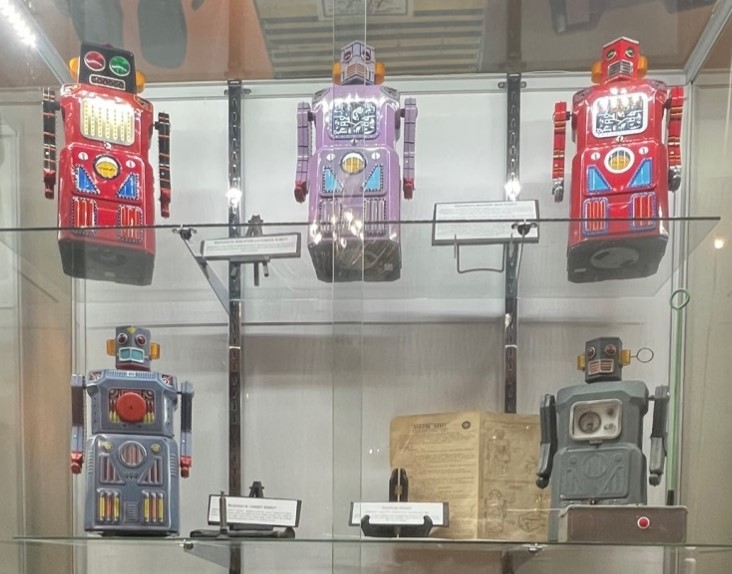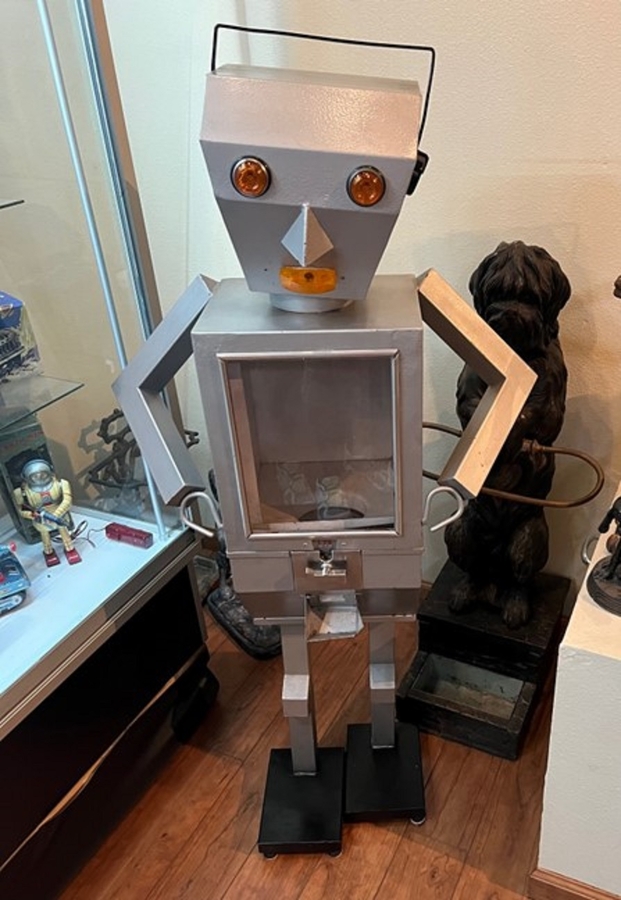All Press Releases for November 16, 2023
DFW Elite Toy Museum's "Robots and Space Toys" Exhibit Features Robot Gumball Dispenser and Rare Masudaya "Gang of Five" Robots
Part of the mid-20th century collection of space toys, these unique collectibles offer visitors an opportunity to view rare examples of toy history.
Featured in the popular book "100 Things to Do in Dallas-Fort Worth Before You Die," the museum is open to the public, and hours are 9 a.m.-5 p.m. Monday-Friday, and most Saturdays.
HALTOM CITY, TX, November 16, 2023 /24-7PressRelease/ -- In its newly opened "Robots and Space Toys" exhibit, the DFW Elite Toy Museum in Haltom City, Texas is shining a well-earned spotlight on some unique and hard-to-find robots. The exhibit gives visitors a glimpse into mid-20th century space toy history.
"We're absolutely delighted to offer visitors a chance to experience some really unique space toys," said Museum Director Brian Sturgeon. "In this group, we've included Gumbo the Robot Dispenser, and the storied 'Gang of Five' family of robots. This exhibit provides a once-in-a-lifetime opportunity to see the Gang of Five robots together, which you don't see very often at all," he added.
Gumbo, the Robot Dispenser is a rare and spectacular Italian coin-operated gumball vending machine manufactured in Italy in the mid-20th century. Crafted of polished silver-gray metal, Gumbo is an angular, modernistic-looking robot that's nearly five feet tall. Gumbo's features include a triangular nose, illuminated mouth and orange eyes, and geometric arms with closed C-shaped hands. A clear, glazed chest panel displays the gumball storage area. There is a handy lockable door on the back to insert gumballs, which are dispensed from a chute on the lower center torso. When Gumbo first appeared on Italian streets, children inserted 10 Italian lira (far less than a penny) to get a gumball.
Founded in 1724, Masudaya is Japan's oldest continuously operating toy company. During the post-World War II era, Masudaya produced a family of robots comprising five battery-operated skirted robots. The word "skirted" means that instead of featuring legs, the base of the robots is solid, resembling a skirt. These robots were manufactured over a period of about seven years, and later became affectionately referred to by collectors as the now well-known moniker, "Gang of Five."
The first radio-controlled, battery-operated robot in the group was the 19-inch-tall Radicon Robot, produced in 1957. Radicon's tinplate body is 15 inches tall and is blue-gray in color, with a red grill mouth, red eyes, and yellow ears. A four-inch-long antenna stretches vertically from his right ear, with a shorter one angled horizontally from his left ear. Radicon's abdomen is encased with a glass viewing window, displaying light, coil and gauge.
Next in the series was the 15-inch-tall Non-Stop Robot, which was issued in 1959. Also known as Lavender Robot due to its unusual color, Non-Stop was constructed of tin, with the same body mold as Radicon. This robot featured non-stop, or "bump-and-go" action, which means that if he runs into a wall or other obstacle, he corrects himself by changing direction to properly continue his mission.
Considered by collectors to be the "holy grail," the 15-inch-tall, Machine Man Robot is the rarest member of the "Gang of Five," and was manufactured in 1960 for just one year. The battery-operated Machine Man is bright red in color, with blue, yellow and black accents. Fabricated of lithographed tin, he has illuminated eyes and ears, with beautifully lithographed rivets and gearbox on his chest. Machine Man includes "bump-and-go action.
But what makes Machine Man so unique? Unlike the other four, he was never available for standard retail purchase. Machine Man was a special order from an American importer, and toy robot experts believe that about 12 dozen of these robots were manufactured for that customer. That meant they were produced in much smaller numbers than the other Gang of Five robots. Because of this, experts estimate that fewer than a dozen exist today.
In 1962, Masudaya released the 15-inch-tall, bright-red, Giant Sonic Robot, also known as Train Robot. Batteries powered his red and green flashing eyes, and illuminated his head dome, mouth, and ears. At the end of his black swinging arms are red C-shaped hands. Gorgeous, brightly colored lithograph makes this robot unique, but that's not all. Giant Sonic also includes non-stop "bump-and-go" action, and emits a "supersonic sound effect" that's reminiscent of a train whistle.
Shooting Giant Robot, or Target Robot, was added to the family in 1964-65. This 15-inch-tall robot was designed with a tin shooting pistol and two rubber-tipped darts. Target Robot came with a dart-shooting gun, suction cup darts, and a carnival-style target on his chest. Hitting the target with the dart caused the robot to scream, turn around and go away before returning. According to the box, "Shoot him–he roars, flashes and goes away…soon comes back to you!"
All the robots include their original boxes, which makes them especially rare. Just imagine, on a Christmas morning, when a child opened his gifts, and opened the box to see and then play with the robot. It's easy to see why the boxes never survived.
The DFW Elite Toy Museum is the brainchild of businessman Ron Sturgeon, who first started collecting toy Mercedes cars more than 40 years ago. Sturgeon expanded his interests to include rare and vintage automobile themed items such as race cars and scale models. As the years progressed, Sturgeon's interests expanded to include vintage toys, unique signs, automotive memorabilia, and other rare and historic collectibles. As his burgeoning collection grew, Sturgeon hatched a plan to open the DFW Elite Toy Museum, home to the current special exhibit, "Robots and Space Toys." This exhibit runs through March 2024, and contains robots and space toys from the mid-20th century, including the rare Atom Jet Racer, Electroman Robot, and the unusual Volkswagen Beetle Space Patrol Car.
About DFW Elite Toy Museum
Rare cars, dog antiques, collectible toys, and hard-to-find memorabilia are featured at the DFW Elite Toy Museum, which contains more than 3,000 pieces collected by serial entrepreneur and real estate developer Ron Sturgeon. Admission is free to the dog-friendly museum, which is located at 5940 Eden Drive in Haltom City, Texas. On display now at the museum is a special "Robots and Space Toys" exhibit, featuring some unique and hard-to-find robots. The exhibit, which is available to see during the museum's regular hours, allows visitors to experience mid-20th century space toy history in person. Sturgeon owns the only two museums in Haltom City, a suburb of Fort Worth, the toy museum and the salon and spa museum.
Featured in the popular book "100 Things to Do in Dallas-Fort Worth Before You Die," the museum is open to the public, and hours are 9 a.m.-5 p.m. Monday-Friday, and most Saturdays. Special events and groups are welcome with advance notice. View this video to discover how Sturgeon started his collection more than 40 years ago, and how that led to opening the museum. Learn more by visiting the website at dfwelitetoymuseum.com. You can also follow the museum's Facebook page.
# # #
Contact Information
DFW Elite Toy Museum
Haltom City, TX
United States
Voice: (682) 310-0591
E-Mail: Email Us Here
Website: Visit Our Website
Follow Us:


